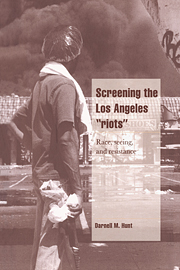Book contents
1 - Introduction
Published online by Cambridge University Press: 23 January 2010
Summary
On Wednesday, April 29,1992, a hazy spring afternoon in Los Angeles, two words leaped forward again and again from the city's electronic media: not guilty, not guilty, not guilty. Within minutes, order was disrupted as some residents of the city took to the streets. Others, trying to make sense of what was happening, monitored television images of rage, hope and despair from the safety of their living rooms.
When the smoke finally cleared a few days later, fifty-one people had died, more than $1 billion worth of property had been reduced to ashes, and thousands had been arrested in what the Los Angeles Times described as “the worst riots of the century” (Coffey 1992, p. 49).
News media first informed the world of verdicts in the Rodney King beating case at about 1 pm on April 29. At this sstime, most people in Los Angeles and across the nation were stoccupied by the routine demands of day-to-day living. An infinitesimally small segment of these people, of the potential media audience, was present in the Simi Valley courtroom as the verdicts were being read. An even smaller segment had been present over the course of the entire trial. A somewhat larger, but still quite small segment of the potential audience lived in areas the media were to later identify as “riot” areas. In short, only a small segment of the media audience had firsthand knowledge concerning the outbreak of the events or the causes to which they had been attributed by the media.
- Type
- Chapter
- Information
- Screening the Los Angeles 'Riots'Race, Seeing, and Resistance, pp. 1 - 12Publisher: Cambridge University PressPrint publication year: 1996

